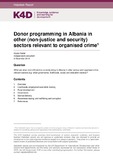| dc.contributor.author | Haider, Huma | |
| dc.coverage.spatial | Abania | en |
| dc.date.accessioned | 2020-01-09T13:46:40Z | |
| dc.date.available | 2020-01-09T13:46:40Z | |
| dc.date.issued | 2019-12-06 | |
| dc.identifier.citation | Haider, H. (2019). Donor programming in Albania in other (non-justice and security) sectors relevant to organised crime. K4D Helpdesk Report. Brighton, UK: Institute of Development Studies | en |
| dc.identifier.uri | https://opendocs.ids.ac.uk/opendocs/handle/20.500.12413/14966 | |
| dc.description.abstract | This helpdesk report provides an overview of sectors relevant to the existence and prevalence of organised crime in Albania; and a mapping of donor work in these sectors. While the programmes and projects discussed are not necessarily designed and adopted specifically to counter organised crime, linkages can be inferred. Literature was selected through database searches (Google, Google Scholar, Web of Science) and by visiting multilateral and bilateral donor websites. Corruption and organised crime are prevalent in Albania and remain key problems in the country. Institutional and everyday petty corruption undermine social trust and creates an environment in which the rule of law is weak and higher order criminal activity can more easily flourish (UNODC, 2015). Corruption is closely interlinked with organised crime as many of the country’s senior state officials are involved in smuggling, contrabands, tax evasions and land grabbing (Sokoli and Resulaj, 2013). Corruption poses a major money laundering risk in Albania as it generates significant amounts of criminal proceeds (COE, 2018). Trafficking in human beings and drugs are also key problems. Albania has been the region’s top producer of cannabis (Global Initiative, 2019). Trafficking in humans for sexual exploitation occurs internally. Many girls and women, particularly Roma and other marginalised groups with low socio-economic backgrounds, are trafficked in main cities in Albania (Meçe, 2016). Organised crime and economic inequality and development are correlated (EC, 2018). Key areas of development requiring attention to tackle organised crime in Albania and elsewhere include: livelihoods and employment; rural development; governance reform; and service delivery. Improving the poor socio-economic conditions of vulnerable populations, for example, can help to prevent human trafficking (Meçe, 2016). This query uses these core areas to structure this report. | en |
| dc.language.iso | en | en |
| dc.publisher | IDS | en |
| dc.relation.ispartofseries | K4D Helpdesk report;708 | |
| dc.rights.uri | https://www.nationalarchives.gov.uk/doc/open-government-licence/version/3/ | en |
| dc.subject | Aid | en |
| dc.subject | Education | en |
| dc.subject | Governance | en |
| dc.subject | Social Protection | en |
| dc.title | Donor Programming in Albania in Other (Non-justice and Security) Sectors Relevant to Organised Crime | en |
| dc.type | Helpdesk | en |
| dc.rights.holder | © DFID - Crown copyright 2019 | en |
| dcterms.dateAccepted | 2019-12-06 | |
| rioxxterms.funder | Department for International Development, UK Government | en |
| rioxxterms.identifier.project | K4D | en |
| rioxxterms.version | VoR | en |
| rioxxterms.funder.project | 238a9fa4-fe4a-4380-996b-995f33607ba0 | en |

